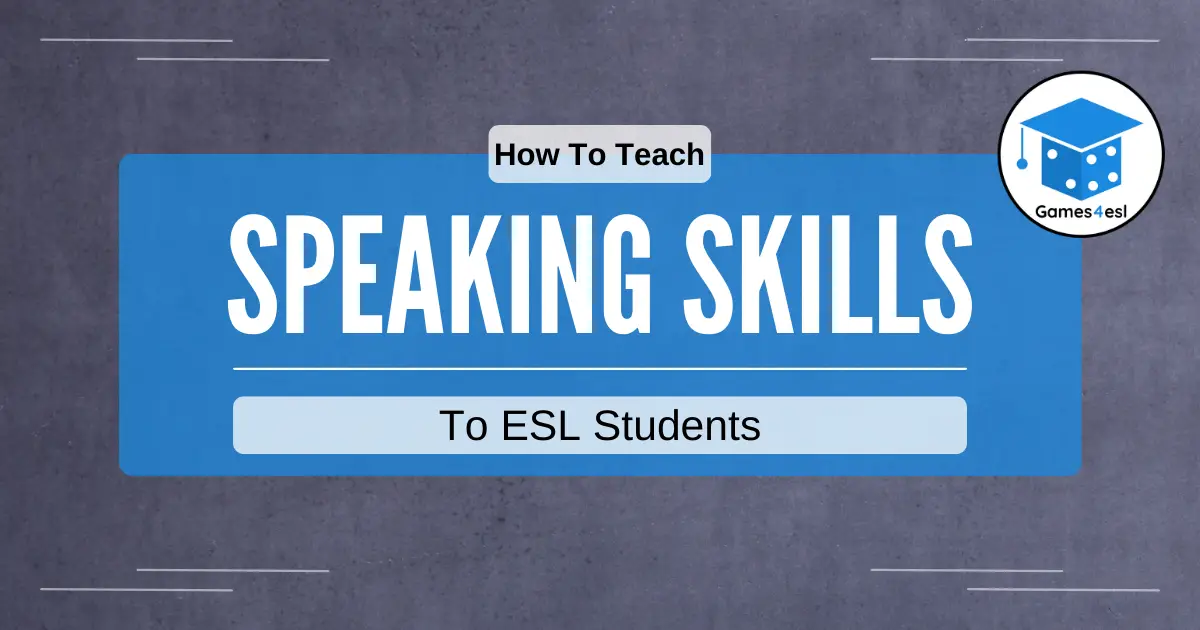How To Teach Speaking Skills To ESL Students | 6 Tips For Success
Speaking in class can be daunting for any student, but it can be especially challenging for students who are learning English as a second language. Even students who have some level of proficiency in reading and writing in English often struggle with speaking. This can be due to factors such as timidness, fear of making mistakes, or a lack of confidence.
Fortunately, there are a number of strategies that ESL teachers can use to help their students overcome these challenges and become more confident speakers of English. Below, we’ll share some of our top tips for teaching speaking skills to ESL students.
6 Tips For Teaching Speaking To ESL Students
1. Make Speaking A Priority From Day One
At the beginning of the semester, let your ESL students know that speaking will be an integral part of the class and that they will be expected to participate often. You can create simple classroom routines that encourage students to speak English every lesson.
For example, for the first few minutes at the start of every class, you can get students to ask and answer a question with their partner. This can be a question about what they ate for breakfast, what the weather is like that day, their favorite subject, etc. Using routines like this will get students into the habit of speaking English in class and help them to see that their contributions are valued.
2. Use Pair Work And Small Groups

One of the best ways to get ESL students speaking is to put them in pairs or small groups when they play speaking games or complete tasks. This gives them the opportunity to practice speaking English without the pressure of having to perform in front of the entire class. Conducting speaking activities in this way also enables students to receive immediate feedback from their partners, which can help them to develop their speaking skills more quickly.
3. Create Opportunities For Informal Conversations.
Informal conversations are a great way for students to practice their English speaking without feeling like they’re being “tested.” Strike up a conversation with them about their weekend plans or ask them about their favorite sports team.
Not only will this help them feel more comfortable speaking, but it will also give you a chance to get to know them better as individuals. You can then tailor your lessons to your students’ interests which is a great way to keep students engaged and motivated. If you need ideas for questions to ask, check out these fun Ice Breaker Questions.
4. Use Speaking Games And Activities
Using plenty of games and activities is a great way to get students to practice their speaking skills. Students, especially kids, learn best when they are enjoying the class and having fun. There are many speaking games you can play, but here are a few of our favorites:
Conversation Cards
This is a great game for practicing speaking and listening skills. Create a set of cards with different conversation topics on them. Next, have each student choose one of the cards at random. Students must then start a conversation about that topic with the person next to them. After a few minutes, have all students stand up, walk around the class and swap their conversation card with someone else. Students should then sit down in a different seat with a different partner and have a new conversation about the topic that is on their card.
The Word Association Game
This is a great game for practicing vocabulary and speaking skills. To play, each student will say a word in English. The next person then has to say a word in English that is associated with the first word. This continues until someone can’t think of a word. This is a great way to help your students expand their vocabulary and practice speaking in English. For more fun variations of this game, check out these Five Fun Word Association Games.
The 20 Questions Game
In this game, one student thinks of something, and then other players ask questions to figure out what the other person is thinking of. Each time, the student can only answer yes or no. This activity is a fun way to get students speaking in English while developing their vocabulary at the same time. You can find some fun ideas for the 20 questions game here.
Conversation Snakes And Ladders
This fantastic conversation game from Twinkl.co.uk can be used by students of any level for a quick and easy speaking game. To play, simply roll the dice and use the conversation cards provided to spark conversations. Check out this free conversation board game here.
5. Model Correct Pronunciation And Encourage Repetition.
One of the biggest challenges ESL students face when speaking English is pronunciation. There are many sounds in the English language that may not exist in their mother tongue. When teaching students speaking skills, it is important to regularly model correct pronunciation and give students ample opportunities to say the words and sounds out loud.
If students have difficulty pronouncing words or feel like they are saying words wrong, they can become demotivated and be less likely to speak in class. By modeling the correct pronunciation of words and having students repeat and practice, they can learn to pronounce words accurately and will be more confident speaking in English.
6. Utilize Technology
There are many online tools and resources that can be used to support ESL students’ speaking skills development. From online chat rooms to video-conferencing software, there are endless possibilities for giving your students more opportunities to speak English outside of class time. Plus, since most students are already comfortable using technology, incorporating it into your lesson plans will make learning more enjoyable for them.
Wrapping Up
Although learning how to speak English can be tough for ESL students, there are a number of things that teachers can do to help them succeed. From using pair work and small groups to incorporating games into instruction, these strategies will help your students build confidence and proficiency in spoken English!


